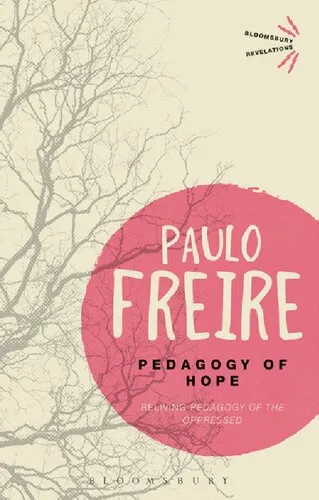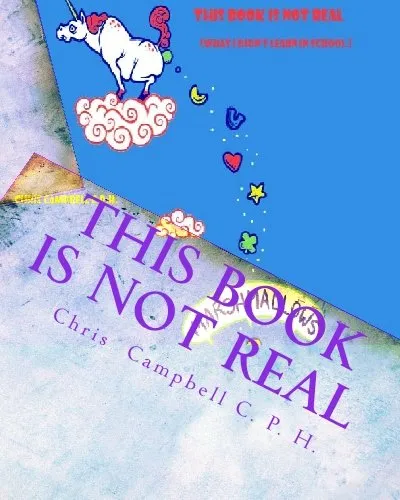Pedagogy of Hope: Reliving Pedagogy of the Oppressed
5.0
بر اساس نظر کاربران

شما میتونید سوالاتتون در باره کتاب رو از هوش مصنوعیش بعد از ورود بپرسید
هر دانلود یا پرسش از هوش مصنوعی 2 امتیاز لازم دارد، برای بدست آوردن امتیاز رایگان، به صفحه ی راهنمای امتیازات سر بزنید و یک سری کار ارزشمند انجام بدینکتاب های مرتبط:
خلاصه تحلیلی کتاب
کتاب Pedagogy of Hope: Reliving Pedagogy of the Oppressed بازخوانی انتقادی و عاطفی اثر پیشین من، یعنی Pedagogy of the Oppressed، است. این اثر به دنبال آن است که با نگاهی دوباره به مسیرهای فکری و عملی آموزش رهاییبخش، پیوندی زنده با امید به تغییر اجتماعی ایجاد کند. امید، نه به عنوان احساسی منفعل بلکه به مثابه کنشی آگاهانه، محور اصلی روایت است.
در این کتاب، تجربههای شخصی و جمعی، تعامل با جنبشهای اجتماعی، و پرسشهای بنیادین آموزش مطرح میشوند. هدف، ایجاد بستری برای گفتوگوی انتقادی میان معلم، دانشآموز و جامعه است؛ گفتوگویی که منجر به بازشناسی توانایی انسان در تغییر ساختارهای ستمگر میشود.
این اثر نشان میدهد که چگونه «آموزش انتقادی» میتواند در عمل، موتور محرک عدالت اجتماعی باشد، و در عین حال، اهمیت بازنگری مستمر در تجربههای پیشین را برجسته میکند.
نکات کلیدی و کاربردی
کتاب به تبیین این موضوع میپردازد که امید، باید به شکل آگاهانه و مبتنی بر عمل اجتماعی پرورش یابد. این امید تنها با مشارکت فعال در فرایندهای یادگیری و مبارزه جمعی معنا پیدا میکند.
یکی از نکات برجسته، پذیرش تغییر به عنوان فرآیندی مداوم و واکنشپذیر نسبت به شرایط واقعی است. آموزش رهاییبخش، روش ثابت و بستهای نیست؛ بلکه زنده، متحول و وابسته به زمینههای فرهنگی، سیاسی و اقتصادی است.
کتاب تاکید میکند که بدون گفتوگوی آزاد و نقادانه، هیچ راه پایدار به سوی عدالت وجود ندارد. گفتوگو باید بر مبنای احترام، پذیرش تفاوتها و باور به توانمندی جمعی شکل گیرد.
به کارگیری مفاهیم کتاب در محیطهای آموزشی امروز، کمک میکند تا دانشآموزان و معلمان فراتر از انتقال اطلاعات، به توانمندسازی و ساخت آگاهی انتقادی بپردازند.
نقلقولهای ماندگار
در طول کتاب، جملات اندیشیدهای مطرح شدهاند که میتوانند الهامبخش پژوهشگران و فعالان اجتماعی باشند. هر نقلقول بازتابی از درک عمیق نسبت به پیوند میان امید و عمل اجتماعی است.
امید، یک انتظار منفعل نیست؛ کنشی است که در دل مبارزه متولد میشود. نامشخص
آموزش، زمانی رهاییبخش است که به توان انسان برای تغییر باور دارد. نامشخص
چرا این کتاب اهمیت دارد
در جهان امروز که چالشهای سیاسی، اقتصادی و فرهنگی شدیدتر از همیشه خود را نشان میدهند، نیاز به بازاندیشی در فلسفه آموزش بیش از پیش احساس میشود. این کتاب، با بازخوانی تجربه پیشین و افزودن لایههای تازه به آن، دریچهای باز به سوی آیندهای مبتنی بر امید آگاهانه است.
برای پژوهشگرانی که به دنبال فهم عمیقتر ارتباط بین نظریه و عمل هستند، این اثر نمونهای ارزشمند است. توجه به «عدالت اجتماعی» در کنار روشهای آموزش انتقادی، این کتاب را به منبعی مهم در علوم انسانی و تربیتی تبدیل کرده است.
همچنین، پرداختن به تجربههای شخصی و روایتهای زنده، مطالعه اثر را برای کتابخوانهای جدی جذابتر میکند. این کتاب نه تنها یک تحلیل نظری، بلکه دعوتی عملی برای مشارکت در تغییر اجتماعی است.
نتیجهگیری الهامبخش
در نهایت، Pedagogy of Hope: Reliving Pedagogy of the Oppressed به ما یادآوری میکند که امید را باید ساخت، نه صرفاً در انتظار آمدنش نشست. این کتاب، پلی میان گذشته و آینده است؛ میان آرمان و عمل. اگر دغدغه آموزش رهاییبخش و عدالت اجتماعی دارید، مطالعه این کتاب را آغاز
Analytical Summary
In Pedagogy of Hope: Reliving Pedagogy of the Oppressed, Paulo Freire revisits the cornerstone principles of his earlier work Pedagogy of the Oppressed, engaging them critically through the lens of decades of experience in education, activism, and dialogue. This reflective volume is not simply a restatement of previous theories; it is a profound reassessment informed by the socio-political transformations and pedagogical challenges that followed the original text’s publication.
Freire approaches his own foundational ideas with humility and intellectual rigor, acknowledging both the enduring relevance and the evolving context of critical pedagogy. The book confronts misunderstandings about his earlier propositions, clarifies nuanced concepts, and extends the dialogue to educators and learners navigating contemporary global realities. It also offers autobiographical elements, situating theoretical insight in personal encounters, community struggles, and solidarity movements across diverse cultures.
Written in the 1990s — precise publication year varies by edition and is not reliably confirmed across all sources — the work mirrors Freire’s commitment to sustaining hope as a political necessity. Education, for Freire, is never neutral; it either serves to domesticate or to liberate. In this text, hope is not passive wishing but an active, collective engagement with possibility, grounded in historical awareness and ethical responsibility.
Key Takeaways
The book distills decades of thought into actionable insights for educators, activists, and anyone concerned with social justice through learning.
Firstly, it reaffirms the centrality of dialogue in the learning process, positioning it as a critical counterpoint to top-down, authoritarian models of education. This dialogical method recognizes the agency of learners as co-creators of knowledge.
Secondly, Freire illustrates that hope is inseparable from critical reflection and praxis — the intentional coupling of reflection and action toward transformative ends.
Thirdly, he emphasizes that critical pedagogy is dynamic, adapting to changing historical, cultural, and political contexts while remaining rooted in the principles of human dignity and equity.
Memorable Quotes
“Without a sense of hope, we cannot begin the struggle to transform reality.” Unknown
“Education is a political act, and we must choose which interests it will serve.” Unknown
“Dialogue means a humble, loving, and courageous encounter toward mutual humanization.” Unknown
Why This Book Matters
Pedagogy of Hope: Reliving Pedagogy of the Oppressed is more than a retrospective; it is an urgent call for sustained critical engagement with the forces shaping education and society.
To educators committed to transformative education, this work offers conceptual clarity and moral encouragement. To policymakers and community organizers, it serves as a reminder that education is inherently tied to the structures of power and must be reimagined to serve the collective good, not the status quo.
In bringing together personal narrative, political analysis, and pedagogical theory, Freire invites readers into a shared responsibility: to resist resignation and nurture the conditions in which hope can be enacted as a historical force.
Inspiring Conclusion
By revisiting and reinterpreting the foundational insights of Pedagogy of Hope: Reliving Pedagogy of the Oppressed, Paulo Freire reaffirms that to teach is to engage with the world in a transformative, ethically grounded, and hopeful way.
Freire challenges us to embrace hope as a decisive element in our political and pedagogical lives. He reminds us that hope without action is mere wishful thinking, and action without hope risks falling into cynicism and despair. This dialectical balance is the pulse of transformative education.
For readers — educators, scholars, activists, and reflective citizens — the next step is clear: read, discuss, and share these ideas, applying them within your spheres of influence. In doing so, you contribute to the living tradition of critical pedagogy and to the ongoing project of humanization that this work so eloquently defends.
دانلود رایگان مستقیم
شما میتونید سوالاتتون در باره کتاب رو از هوش مصنوعیش بعد از ورود بپرسید
دسترسی به کتابها از طریق پلتفرمهای قانونی و کتابخانههای عمومی نه تنها از حقوق نویسندگان و ناشران حمایت میکند، بلکه به پایداری فرهنگ کتابخوانی نیز کمک میرساند. پیش از دانلود، لحظهای به بررسی این گزینهها فکر کنید.
این کتاب رو در پلتفرم های دیگه ببینید
WorldCat به شما کمک میکنه تا کتاب ها رو در کتابخانه های سراسر دنیا پیدا کنید
امتیازها، نظرات تخصصی و صحبت ها درباره کتاب را در Goodreads ببینید
کتابهای کمیاب یا دست دوم را در AbeBooks پیدا کنید و بخرید
1230
بازدید5.0
امتیاز50
نظر98%
رضایتنظرات:
5.0
بر اساس 0 نظر کاربران
"کیفیت چاپ عالی بود، خیلی راضیام"
Questions & Answers
Ask questions about this book or help others by answering
No questions yet. Be the first to ask!



